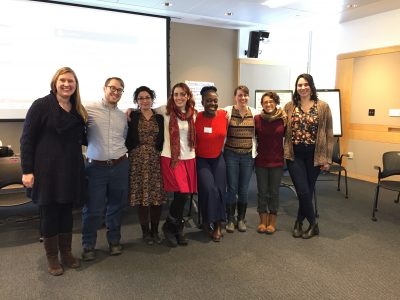Future faculty learn inclusive teaching practices

Inclusive Teaching Institute planning committee with CIRTL at Cornell Director Colleen McLinn (far left)
March 2016
Effective teachers engage in a practice known as reflective teaching. Through a process of self-observation and gathering evidence of student learning, these teachers make incremental improvements in their teaching practice.
Cornell’s future faculty are learning how to be better teachers by asking themselves questions such as:
- How do my experiences and backgrounds shape my teaching?
- How do I meet the diverse learning needs of my students?
- How do I create an environment where students feel safe and free of prejudice so they can engage in critical thinking and deeper learning?
These questions—plus many more—were among those discussed in detail this past February break among Cornell graduate students and postdocs during the Inclusive Teaching Institute, a two-day retreat sponsored by the Cornell University Center for the Integration of Research, Teaching, and Learning (CIRTL at Cornell) and the Center for Teaching Excellence (CTE).
The Inclusive Teaching Institute was designed to expand participants’ understanding of diversity through readings, activities, and discussion, and then provide strategies for implementing improvements into their future teaching practices.
Cornell faculty members have participated in a similar Faculty Institute for Diversity for a number of years. The idea for a student-oriented institute arose through conversations between graduate students and CTE Director Theresa Pettit. “In talking about it with graduate students, they said ‘we should do something similar; we’re really interested in that topic,’” Pettit said.
And indeed, when Pettit and CIRTL Director Colleen McLinn began asking more students whether there was demand for a diversity training institute, they discovered that students not only wanted to attend, but were interested in helping organize and run it as well.
The seven graduate students and postdocs who volunteered as planning committee members for the Inclusive Teaching Institute brought such experience and enthusiasm that according to McLinn, “the students were the ones who really decided on the content,” while she and Pettit “supported mainly in a logistical role, guiding them when needed.”
It quickly became clear that it wasn’t only the student organizers who desired this type of program: Shortly after advertising for the institute, the planning committee received 49 applications, of which 30 were invited to participate.
For participant Ni (Jenny) Feng, a postdoc in neurobiology and behavior, the institute seemed like a valuable learning opportunity. “Low diversity in STEM fields is a huge problem that I feel very passionate about. I would like to become a professor one day, so I wanted to educate myself on how to build a more inclusive environment in my classrooms.”
The institute was divided into two four-hour days. The first day was focused on the theme of identity as well as establishing a community among the participants and organizers where everyone could share their own experiences.
“I really appreciated the institute’s focus on discussion and community building among the participants,” said participant Stephen Kim, a graduate student in English. “It was powerful to see that many individuals in very different fields all shared a deep commitment to inclusive teaching.”
The second day of the institute was aimed at developing strategies, through discussions and activities, to help participants create inclusive teaching environments in their current and future classrooms.
Some activities focused on using role-play to help students learn to handle tense classroom situations. In one activity, workshop organizers reenacted a classroom where insensitive remarks were made about minority students before the class began and the teaching assistant chose to ignore the situation. “It’s always good to be reminded that if you ‘see something, say something,’ and this activity showed us the best ways to address situations like this,” Feng said.
The institute was a learning experience for facilitators as well. Hajer AlFaham, a graduate student in political science, noted that she felt fortunate to not only have a hand in planning the institute but to also participate as a listener and a facilitator, sharing her stories and hearing from others. “Both days were productive, challenging, and incredibly meaningful for me,” she added.
Indeed, the intimate nature of the institute helped create a tight-knit community of these future faculty members. “We all became very close,” said Marsha Jean-Charles, graduate student in Africana Studies and an institute organizer. “We knew these were going to be difficult conversations to have and we were committed to creating a comfortable environment by being very open with one another.”
Jean-Charles adds that the institute was designed so that those who participated this year will help plan and lead the next institute in spring 2017. To aid this and keep everyone in touch, facilitators and participants will continue to meet throughout this semester in a series of public events. “When you have this much interest, you just have to keep it up,” Pettit said.
Facilitators and participants alike reported a strong commitment to the principles behind the institute and hope that it grows and serves as a model for all future faculty members. “We’re not just doing this for Cornell, we’re doing this because we really believe that all students’ voices should be heard and should feel included in class,” Pettit said. “This is what education today needs to be.”
Sally Kral is a communications assistant in the Graduate School
The above originally appeared in the Spring 2016 Graduate School Alumni Newsletter


